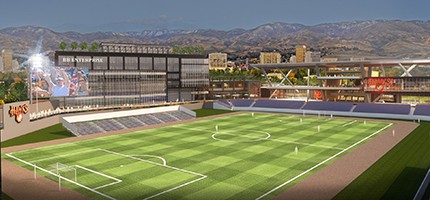


One of the biggest con jobs in all of government is “urban renewal.” The pleasant-sounding name obscures reality. Urban renewal is less about renewing urban areas and more about finding clever ways to fund big projects and to subsidize developers without drawing the attention, or having to get the permission of voters.
House Bill 217 is one of the most important pieces of legislation likely to pass the Legislature this session. The measure would provide a small but meaningful safeguard against the wanton misuse of urban renewal being contemplated by Boise’s city government. House Bill 217 would require a 60 percent voter approval to use urban renewal tax revenue for a sports stadium, such as the one Boise wants to build for a private developer.
Boise Mayor David Bieter and his city council are none too happy about this. They hope to build the $40 million stadium, funded primarily through debt, without having to sell the idea to voters. They’d like to do the same with a reprehensible plan for a $105 million or so new library.
City officials use this scheme to duck tough discussions. By dodging a public vote, Bieter and the city council members won’t have to discuss problems with other government-built stadiums across the country, which have turned into giant money pits, delivering far less value and economic activity than promised. If Boiseans are not allowed a vote, Boise politicians avoid open discussion about the backroom deals that make the stadium project possible.
Stadium funding would come from the property tax diversion scheme that underpins every urban renewal district, a ploy known as tax increment financing. This mechanism redirects tax money derived from increased property valuations in an urban renewal zone and often gives the money back to the developer. The increase in tax revenue is money that would otherwise be used for government services such as schools, police, fire, or infrastructure.
For example, say that unimproved land is deemed part of an urban renewal district. Soon, a multi-million-dollar project is built on that land. As far as every relevant taxing district—the city, school district, highway district, the county and so on—is concerned, the land is still unimproved, still assessed for tax purposes at its original value, which could be just thousands of dollars, even though the improvements made to the land makes the same property now worth millions.
The difference between the original assessed value of the unimproved property and the value of the improvement is known as the increment, and the property taxes derived from the increment goes to the urban renewal district. In turn, the urban renewal district often writes a check back to the developer for the project, using property tax monies collected both from increased valuations on the formerly unimproved ground as well as other improvements made inside the district.
These types of crony development schemes are among the reasons property taxes are so high in portions of Idaho. Urban renewal is used to divert tax dollars to developers, while tax levies are artificially inflated because they’re built off of the distortion of pre-development property values. When urban renewal goes away, tax levies come down because property values once again reflect reality.
In truth, the government shouldn’t be in the sports stadium-building business. Thus, a better piece of legislation would ban Idaho governments from undertaking such ridiculous enterprises that rightfully belong in the hands of the open market. That said, House Bill 217 is a step in the right direction.
Additionally, like other urban renewal reform measures over the years, HB 217 contains loopholes likely to be exploited, and I have no small fear that Boise will find ways to bypass voters for its proposed taxpayer-funded sports complex. But the sentiment of HB 217 is spot-on: Voters should be consulted on urban renewal projects, such as the stadium being considered by Boise.


